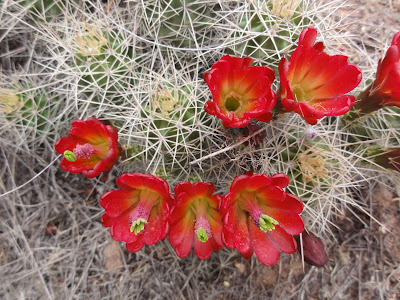"How I like claret!" gushed John Keats. He meant, of course, the red wine from Bordeaux. But I'm fond of another - Claret Cup Cactus.
Its botanical name is Echinocereus triglochidiatus. Echino refers to its hedgehog-like spines. Cereus describes the funnel-shaped structure in the center of the flower. Triglochidiatus refers to its three-pointed fruit. But none of that adequately describes the simple beauty of this little creature.
Claret Cup produces eye-popping red flowers in spring. The long, white spines will pierce your skin any time of year, but are starkly beautiful - at least to my mind. Though rather small, it will stop you in your tracks when you happen upon it.
Claret Cup is native to the American Southwest, so it will be a perfect addition to a native cactus and succulent collection. Don't be digging it up in the wild. I believe it's legally protected in the State of Nevada, but even if it weren't, indiscriminate collecting can easily lead to endangerment.
I highly recommend Claret Cup for your cactus collection.
Name(s): Echinocereus triglochidiatus, Claret Cup Cactus, Strawberry Cactus, Crimson Hedgehog Cactus
Flower Color: Deep red to orange-red
Bloom Time: Mid-Spring
Foliage: Evergreen, sharp, spiny.
Height/Spread: 12 inches x 24 inches.
Climate Zones: 8, 9, 10, 11
Sun Exposure: Full sun
Soil Condition: Well-drained to dry, average to poor, pH 6.1 to 7.8
Features: Drought tolerant, deer resistant.
Uses: Xeriscaping, massed planting, naturalizing, desert gardens, native plant collections, container gardens, cacti and succulent collections, borders, "homeland security."
Comments: Handle with care!
I'd like to know your thoughts on Claret Cup. Have you grown it? Do you use it in your landscape or as a container plant? Tell us about your experience with Claret Cup in the comment section. If you have any suggestions that might help our readers, please let us know.
Return to GoGardenNow.com.






No comments:
Post a Comment